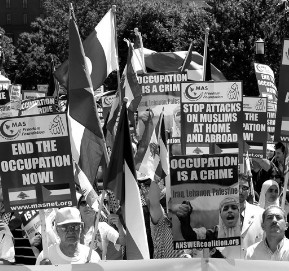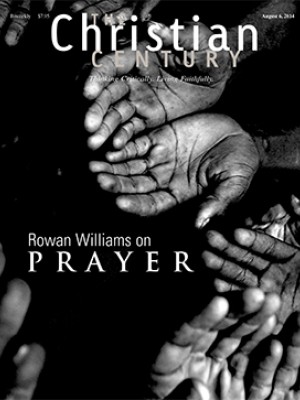On not choosing sides: The peacemaking challenge in Israel/Palestine
The recent escalation of conflict between Israeli and Palestinian forces helps make clear why the rhetoric among liberals and Christians about “the occupation” is woefully inadequate to the challenging call of peacemaking that we espouse. The occupation—which by now needs no subjects, objects, or qualifiers because we all supposedly know what we are talking about—has become the acceptable target that seems to provide a safe platform on which to mount the banner for peace.
If we protest Israel’s occupation of the West Bank as a distinct evil, it seems that we can duck the charge of delegitimizing Israel. We stay on the bright side of the line that gets drawn between criticizing Israeli policies and challenging Jewish sovereignty as a whole. We also get to stand courageously with people who live under daily duress and who have languished without their own sovereignty for far too long. A focus on the occupation gives us simpler options in a complicated conflict. Look at the West Bank and it is not hard to know on whose side compassionate people should stand.
Read our latest issue or browse back issues.
But the violent events of June and July, the outcome of which is still beyond imagining, make it harder to know. Kidnapping and murder of teenage civilians by extremist elements, both Palestinian and Jewish; a barrage of rockets reaching deeper than ever into Israel; drone and missile attacks from Israel on targets precariously if not deliberately situated in dense, civilian neighborhoods—all of these and the clamoring voices that surround, incite, and report them underscore the point that choosing sides over the occupation is both difficult and dangerous, and it does not address enough of the factors that must be resolved if peace is to be achieved.
Choosing sides is difficult because the dynamics that now explain the occupation and prop it up have been so many years in the making, with so many players and so many motives. The land occupied by Israel was a disputed part of Jordan from 1948 to 1967. Like the ambiguous Egyptian rule in the Gaza Strip after 1948, Jordan’s claim to the West Bank was ceded to the Palestinians several decades after the war of 1967 as part of a peace negotiation with Israel.
The Oslo accords in 1993 consolidated negotiating authority under the Palestinian Authority and were aimed at establishing a Palestinian state that would assume sovereignty over the disputed territory. One can write the history of the Oslo process in many ways, but the failure to achieve its aim can hardly be laid at the feet of Israel alone.
Since 1993 negotiations and exchanges between the Palestinians and Israelis have amounted to a deadly dance of mixed signals and defiant posturing by both, together with their various proxies and partners. Israeli governments as different as Yitzhak Rabin’s and Benjamin Netanyahu’s have proven as challenging for Palestinians to discern as the tug-of-war between Fatah and Hamas has been for Israelis. And so an ambiguous occupation draws close to entering a sixth decade.
Choosing sides is dangerous because both Jews and Palestinians live with mortal fear. Both peoples once again now hear their identity and legitimacy, as well as their claim and connection to their homeland, reviled and denied. Both hear calls from some segment of the other people to eliminate their presence, whether physically, culturally, or nationally. When people have reason to fear for their existence, anything that bolsters the case being made against them contributes to the conflict and not to its resolution. That includes simplistic parroting of the evil of occupation. Ratcheting up the fear in either people makes violence more likely, not less.
Moreover, when actually envisioning an end to the conflict it is dangerous to focus on only one party as its cause. If Israel is made the sole actor responsible for ending it, and we imagine that a transfer of territorial control—ending the occupation—will do so, we ignore other deadly forces which will still be at work in the region the day after withdrawal. It is all too apparent that such forces exist within both Israel and the Palestinian community.
So why do churches and people of goodwill focus on the wrong thing? Why is so much denominational time and energy expended debating proposals to undertake corporate divestment aimed at ending the occupation? Our actions are unlikely to move the levers of power in any substantial way or to affect the bottom lines of companies in which our shares represent a fraction of 1 percent.
A basic mistake accounts for such misguided efforts: confusing the expression of humanitarian concern with effective political analysis. Few can challenge the honest concern that rises in the heart when seeing the situation of Palestinian life on the West Bank. Nor can one argue with the imbalance of power that stands between Israel and the Palestinian Authority. In the face of such realities, common human decency demands an empathetic, humanitarian, even pastoral response. In that regard, the occupation and its daily effects on Palestinian life have been exactly the churches’ proper focus, the place where we must start. To ignore or deny that suffering would betray the Lord who calls us to feed, clothe, heal, and comfort the afflicted.
But two other realities call us to move beyond that starting point. Those realities have come into sharper focus in recent events, which have quickly made our debates about the occupation into “the good old days.”
First, there is suffering and need within the Jewish community and Israel as well as in the Palestinian community. We have learned in our wealthy Western society that the outward trappings of success and comfort often obscure but do not erase the reality of pain, suffering, anxiety, alienation, and fear.
While some argue that these afflictions would be lessened if Israel ended its occupation of the disputed territories, there are much broader causes to consider as well. Israel has had to sustain a survival posture well into the third generation of its national existence, negotiating shifting international alliances and now dealing with an Arab world that is profoundly unstable. What should be the liberal, Christian humanitarian response to this suffering?
Second, our humanitarian concern rightly motivates us to analyze the causes of suffering and to work against them. Effective political analysis, however, must consist of more than listening to the perspective of the aggrieved. Our work must be effective in more than symbolic and sympathetic ways. Particularly when two parties can legitimately claim grievances, we must distinguish our analysis of the situation from our compassionate empathy with those caught on each side of it. That is patently true when open warfare looms, and it is no less true when relative calm prevails and “normalizing the occupation” is the greatest threat.
An understandable sense of desperate isolation prompts both Jews and Palestinians to court solidarity actions from churches and other civic institutions. Those actions can be as straightforward as a cup of water to the thirsty and a warm bed to the homeless. In order for actions in the policy arena to bring similar blessing, they must be as judicious and effective, in their own ways, as the cup of water or the warm bed.
Three key steps would make a good start.
Understand, appreciate, and respect the sense of threat that underlies each community’s motivating fear. Whatever we may think of its source or its legitimacy, it is a real factor that must be addressed constructively and not simply dismissed.
Refrain from actions that add to the fear or that add the church’s weight to the sense of righteous victimhood or entitlement on any side. Expect partners and parties in the conflict to work responsibly toward peace in their own communities, not using the other’s inaction as justification for their own.
Encourage, empower, and reassure the principal parties that taking the risks necessary for peace will win support and respect and provide any assets we can to make that risk taking more viable and realistic.
Many of the best analysts and participants in the field have reminded us that progress toward peace cannot be achieved until the principal parties all find reason to believe that they will gain more from risking peace than from continuing the status quo. That means the status quo—including the occupation—will not end just because ending it is a good thing. It will end because something better will become a realistic alternative for everyone.
While we work toward that constructive goal, our compassionate response to suffering must continue and our assessment of the causes of suffering must be acute. If in weariness or frustration or anger, however, we mistake our earnest human compassion for effective political analysis, we risk being drawn into the conflict simply as someone’s armament and supply against another. Then our true value as peacemakers is traded for empty gestures and passing good feelings. Both Palestinians and Jews deserve better from us.






